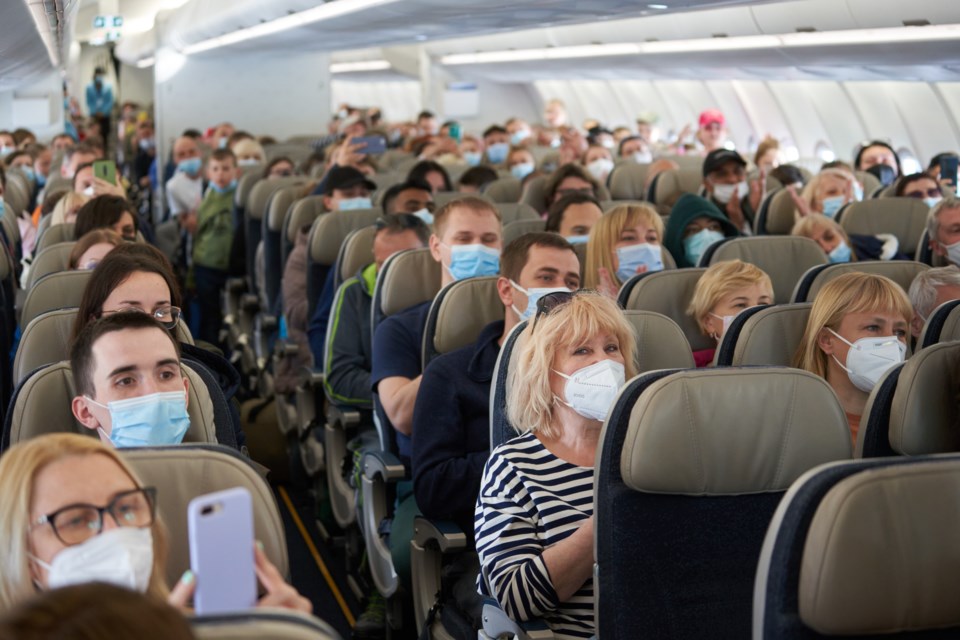Migrant health experts are warning that the swift influx of Ukrainians fleeing to Canada could put some at risk of falling through cracks in primary care.
A new analysis published in the Canadian Medical Association Journal on Monday suggests that Canada's special visitor visa program for Ukrainians escaping war may help streamline the immigration process, but could also create gaps in access to medical care.
"It is a balance, because Canada really has stepped up to the current Ukrainian crisis and quickly," said lead author Dr. Christina Greenaway, an infectious disease physician at Montreal's Jewish General Hospital.
"Canada put into place this three-year temporary visa program, which speeds up the process of migration, but it does have some potential downsides."
Ukrainians who come to Canada under the federal program announced in March are allowed to work and study in the country for three years, and are entitled to provincial health coverage for the duration of their stay.
But because these Ukrainian newcomers are classified as "temporary residents" rather than "refugees," they are not eligible for all of the standard services offered by refugee settlement agencies, Greenaway said.
These agencies play an important role in helping migrants navigate Canada's medical system, she said, potentially depriving displaced Ukrainians of care that would facilitate their smooth integration into Canada.
"In the refugee support programs, there is more enhanced mental-health services and psychologic services, eyeglasses and dental services," said Greenaway, a researcher at the Centre for Clinical Epidemiology of the Lady Davis Institute for Medical Research.
"Some of these services are very important for newly arrived people, and with a temporary (resident) program, the Ukrainians will not have access to this unless there is another parallel system that's put in place."
Of particular concern are potential barriers to access mental-health services, which are often vital for people escaping conflict, Greenaway said.
About a third of Ukrainian population has had a mental health condition at some point in their lifetime, she said, noting that these country-wide health statistics may not be representative of the group of migrants who are arriving in Canada.
Ukraine also has high rates of non-communicable diseases and infectious diseases, such as tuberculosis, HIV and viral hepatitis, and low vaccination coverage compared to other European countries, Greenaway said.
Ukrainian migrants will be tested for some of these conditions after arriving in Canada as part of an age-based screening program, but these diagnostic workups aren't as comprehensive as the pre-landing health assessments refugees complete, she said.
Greenaway said Canada needs to strengthen its health systems to better care for people affected by mass migrations, such as increasing access to interpreters that would improve communication between doctors and patients who speak different languages.
"It's an opportunity of crisis to rethink what we're doing, and ensure that we put in place structures that will allow us to address and provide equitable care for everybody," she said.
According to the federal government, 55,488 Ukrainians arrived in Canada between Jan. 1 and June 26.
The government says it received 343,283 applications under the new program for Ukrainians between March 17 and June 28, and 146,461 were approved.
The medical director of the refugee health clinic at Women's College Hospital said he's only seen a few Ukrainian patients, which may be a sign of the "scattered" approach to resettlement.
Dr. Meb Rashid of the Crossroads Clinic has helped identify 60 clinics and clinicians who are offering their services to displaced Ukrainians, and has shared that information with community organizations. But it's hard to say how many newcomers are taking advantage of these resources, said Rashid, who wasn't involved in writing the CMAJ paper.
Many of the migrants the clinic sees didn't have access to primary care in their home countries, he said, and may be receiving routine procedures, such as a blood pressure test, for the first time.
Identifying and treating illnesses early in the migration process is key to helping newcomers build a better life in Canada, said Rashid.
"With the Ukrainian migration, it's really hard to know how many people are connected to health care and how many have not," he said. "There are people that will connect and will connect early, but there will be others that don't. I think that's an opportunity missed."
This report by The Canadian Press was first published July 11, 2022.
Adina Bresge, The Canadian Press



